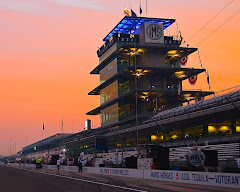In the latest example of why a corporatist approach to motorsports is akin to racing without a fire suit, billionaire hedge fund manager William Ackman apparently will not leave well enough alone at Target Corp. Rebuffed in his previous attempt to remove four board members and replace them with independent directors, Ackman has decided to retain his Target shares in what analysts believe could be the beginning of another hostile takeover bid. What would an Ackman-led Target Corp mean for Chip Ganassi Racing?
Let's just say that Mike Hull might want to reconsider his position in favor of high-tech, high-cost racing.
Target Ganassi Racing generates sponsorship revenues that far exceed the value of the racing product that it supplies. That alone is likely of little concern to Ackman.
However, the mechanism that is used to lever Ganassi's returns would be a good candidate for reconsideration under an Ackman regime. Financial buyers, particularly those who grew up in Westchester County, New York, are not typically big fans of motorsports. More important, they are not even little fans of granting concessions to suppliers just because those suppliers assist in funding a racing team.
Let's use distributors of GPS systems as an example. Garmin is the clear market leader, a still-growing, profitable firm that commands premium prices for its products. Tom Tom had cut into Garmin's market share lead before reporting disappointing quarterly earnings in Q2. Tom Tom is a major associate sponsor of Target Ganassi Racing - that's why Dario Franchitti occasionally drives that pea-green Tom Tom car.
An investor such as Bill Ackman, or at least one of his surrogates, is likely to ask the question: "Why the hell are we stocking so much Tom Tom? Garmin is easier to sell and commands premium prices."
A legacy marketing rep from the previous regime replies: "Tom Tom is a partner in our race team."
Ackman Surrogate: "Our what?"
And that, as they say, is that. This exercise is repeated for all suppliers that are involved in Target Chip Ganassi Racing. The racing program is determined to have come at much greater cost than previously believed due to the carrying cost of unsold merchandise and the opportunity cost of not stocking brands that are easier to sell and at better prices.
Cue the press release. "We appreciate all of the hard work that Target Chip Ganassi Racing has done over the years, but we have determined that alternative marketing and promotion incentives will be more effective...."
Like all IndyCar teams, Target Chip Ganassi Racing is effectively racing without a fire suit. Its revenues are highly concentrated in payments it receives from its leveraged supply chain agreement with Target. There is almost no probability that Ganassi will be able to replace those revenues, again because the cost of the product he supplies is greater than the price at which it is sold. His team manufactures approximately nothing of value. Appearance money won't begin to cover the cost of participation. Without Target the future does not look good.
Of course, it's entirely possible that Ackman will strike out again. If so, then TCGR is likely preserved for some time to come. But know this: there will be another Ackman, and another after him. One of them will pull off the deal, and Ganassi will be out of luck and other people's money.
The same could be said of Roger Penske, who has to be hoping that the FDA doesn't regulate his sponsor out of existence once it commences oversight of the tobacco industry. It is distressing enough that The Captain's own company had to pony-up to allow Will Power to get five more starts in 2009.
We therefore reiterate: the low cost versus high-tech debate is a moot point. Low cost - and we mean really, really low cost - is the only viable strategic option. Choose it now, IRL management, and you might just be surprised to discover who comes around to agreeing with you.
Wednesday, August 12, 2009
Subscribe to:
Post Comments (Atom)


Good discussion. What occurs to me that there has to be more to this deal than just agreeing to carry Tom-Tom (or anyone else) if they chip in on sponsorship for Chip. A personal relationship between Chip and a top Target officer might explain it. A race fan in an executive position might explain it. Both are terrible business justifications. In fact, neither are adequate and could never be admitted. Or...there might be some other value in a B-2-B sense that is not being captured or is not understood. Is the sponsorship a platform for business transactions or building relationships that translate into future sales. While I agree with your overall contention that IndyCar is overly tilted toward these arbitrage deals and need to build consumer appeal for long-term viability, I am convinced there is value creation element that escapes your analysis.
ReplyDeleteMr. Cooper,
ReplyDeleteThere are ample possibilities. For example, might Target receive pricing consideration from the TCGR associate sponsors? Target does not have the kind of pricing power that Wal-Mart possesses. Discounted prices from vendors would not show up on the financial statements. They would be reflected only in the COGS line. Given Target's broad product mix, it is doubtful that even the best analyst would ever know.
What we can say is that someone is paying for this. It might be mere opportunity cost, but that surely counts, too. It is Target Chip Ganassi Racing that is arbitraging its sponsorship. Target and its vendors are engaged in zero-sum transactions, although the costs must be hidden.
Thank you for commenting on this issue. It fascinates me. I am glad to know that I am not alone.
Best Regards,
Roggespierre